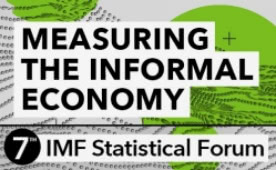Marty Chen, Senior Advisor for WIEGO, was among the experts on the informal economy who spoke at the annual IMF Statistical Forum, highlighting the importance of recognizing the official international statistical definition of informal employment and that it distinguishes between the informal economy and underground or illegal production.
The International Monetary Fund (IMF) has a mandate to promote international monetary cooperation and provide policy advice and capacity development support to help countries build and maintain strong economies. The IMF also makes loans and helps countries design policy programs to solve balance of payments problems when sufficient financing on affordable terms cannot be obtained to meet net international payments. To carry out these functions, the IMF seeks to improve statistics on the economy and GDP of member countries. For the past seven years, the IMF has convened an annual Statistical Forum on key topics related to the economy.
The topic of the 7th IMF Statistical Forum, held on 14-15 November 2019, was Measuring the Informal Economy.
Marty Chen, Senior Advisor of WIEGO, represented WIEGO at the Forum. Two of the speakers at the Forum were well-known experts on the informal economy as well as key WIEGO partners: Michael Frosch from the ILO and Francois Roubaud of the French Research Institute for Development (IRD, Institut de Recherche pour le Development).
The Forum opened with video-recorded remarks by the new Managing Director of the IMF, Kristalina Georgieva, who reflected a nuanced and informed understanding of the informal economy. She defined the informal economy as unregulated activities in agriculture, retail trading and the gig economy and characterized it as a safety net for the poor and as having low incomes, low productivity and limited access to government benefits. She highlighted that the informal economy is an important source of employment for women, especially in developing countries. She concluded that better measurement of the informal economy is needed for better policies towards the informal economy: policies that are more effective and better targeted.
Half of the presentations at the Forum were on measuring the production and GDP contribution of the informal sector using the official international definition of the informal sector (1993 International Conference of Labour Statisticians); the Mexican presentation also featured measures of production and GDP contribution of informal workers outside the informal sector.
The other half of the presentations were on measuring underground production and illegal production: that is, respectively, production of legal goods and services that is concealed from authorities and production of illegal goods and services. Many of the estimates in these presentations were generated by using proxy measures and econometric models.
Both in their presentations and from the floor, Michael Frosch of the ILO and Francois Roubaud of IRD made the case that there are official international definitions of the informal sector and informal economy, as well as proven methods for measuring these phenomena and their outputs directly. Francois also noted that informal sector/employment should no longer be considered non-observable as 120 countries or more are directly measuring the phenomenon; and called for considering the compliance-non-compliance and legality-illegality of both the formal and the informal economy.
Marty Chen of WIEGO made several interventions from the floor, calling for the need to distinguish between the informal economy, underground production and illegal production. She highlighted that the formal economy is involved in underground and illegal production, arguably more so than the informal economy; and she encouraged economists, the IMF and World Bank to use the official international statistical definitions and methods for measuring the informal economy and not to equate the informal economy with non-compliance and illegality.
Find information and presentations from the IMF 7th Statistical Forum.

